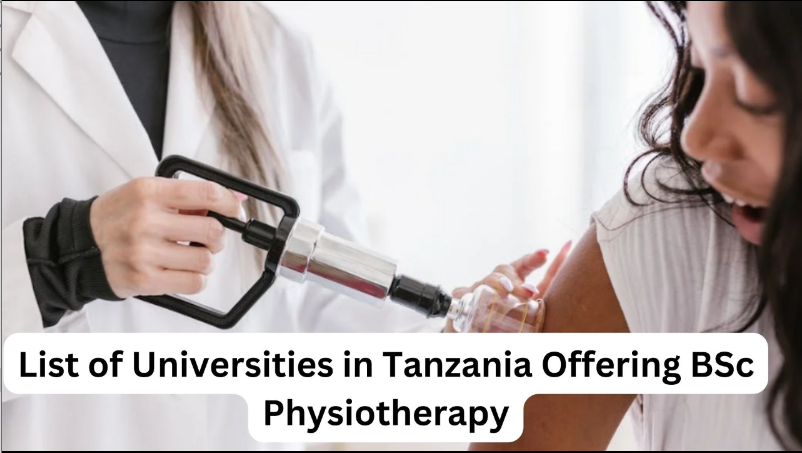
Universities in Tanzania Offering BSc Physiotherapy: Tanzania has a growing healthcare industry, and physiotherapy is one of the fields that is gaining popularity among students. Physiotherapy is a healthcare profession that focuses on the diagnosis, treatment, and prevention of movement disorders, pain, and disabilities. It is a demanding field that requires a combination of theoretical knowledge and practical skills.
To become a physiotherapist in Tanzania, one needs to enroll in a Bachelor of Science in Physiotherapy program at a recognized institution. There are several universities in Tanzania that offer this program, and each has its own unique curriculum and admission requirements. Some of the universities that offer a BSc in Physiotherapy include Kilimanjaro Christian Medical University College, Muhimbili University of Health and Allied Sciences, and Taasisi ya Afya ya Taifa.
Students who enroll in these programs can expect to learn about anatomy, physiology, kinesiology, and pathology, among other subjects. They will also receive hands-on training in various physiotherapy techniques and methods. Upon completion of the program, graduates can pursue careers in a variety of settings, including hospitals, clinics, sports centers, and private practices.
Physiotherapy in Tanzania
Physiotherapy is a healthcare profession that focuses on the assessment, diagnosis, treatment, and prevention of physical impairments, disabilities, and pain. It involves the use of physical modalities such as exercise, manual techniques, and electrotherapy to promote mobility, function, and quality of life. In Tanzania, physiotherapy is a growing field that is increasingly recognized as an important component of the healthcare system.
There are several universities and colleges in Tanzania that offer Bachelor of Science in Physiotherapy programs. These programs provide students with the knowledge and skills necessary to become competent physiotherapists who can work in a variety of settings, including hospitals, clinics, sports centers, and rehabilitation centers.
Some of the universities and colleges that offer Bachelor of Science in Physiotherapy programs in Tanzania include Kilimanjaro Christian Medical University College (KCMUCo), Muhimbili University of Health and Allied Sciences (MUHAS), Taifa Institute of Health and Allied Sciences, Mbeya College of Health and Allied Sciences, and Mwanza College of Health and Allied Sciences.
The Bachelor of Science in Physiotherapy programs in Tanzania typically take four years to complete and consist of both theoretical and practical components. Students learn about anatomy, physiology, pathology, biomechanics, kinesiology, and therapeutic exercise, among other topics. They also gain practical experience through clinical placements, where they work with patients under the supervision of licensed physiotherapists.
Upon graduation, students are eligible to register with the Tanzania Physiotherapy Association (TPA) and practice as licensed physiotherapists. They can also pursue further education and training in specialized areas of physiotherapy, such as sports physiotherapy, pediatric physiotherapy, and neurophysiotherapy.
Overall, physiotherapy is an important healthcare profession in Tanzania that is helping to improve the quality of life of many individuals who suffer from physical impairments and disabilities. With the growing demand for physiotherapy services, the Bachelor of Science in Physiotherapy programs offered by universities and colleges in Tanzania are providing students with the necessary knowledge and skills to become competent and compassionate physiotherapists who can make a positive impact on the lives of their patients.

Physiotherapy (BSc Physiotherapy)
University of Dar es Salaam
The University of Dar es Salaam (UDSM) is a public university located in Dar es Salaam, Tanzania. It is the oldest and largest university in the country and offers a range of undergraduate and postgraduate programs, including a Bachelor of Science (BSc) in Physiotherapy.
The BSc in Physiotherapy program at UDSM is offered by the School of Medicine and is designed to prepare students for a career as a physiotherapist. The program is four years in duration and is divided into eight semesters. During the program, students are exposed to both theoretical and practical aspects of physiotherapy.
The physiotherapy program at UDSM is taught by experienced and qualified faculty members who are committed to providing students with a high-quality education. The program is designed to equip students with the knowledge, skills, and attitudes required to become competent and ethical physiotherapists.
In addition to the physiotherapy program, UDSM offers a range of other health-related programs, including medicine, dentistry, nursing, and public health. The university is also home to several research centers and institutes, including the Muhimbili University of Health and Allied Sciences (MUHAS), which is a constituent college of UDSM.
Overall, the University of Dar es Salaam is a reputable institution that provides students with a high-quality education in physiotherapy and other health-related fields. With its experienced faculty, state-of-the-art facilities, and commitment to excellence, UDSM is an excellent choice for students who wish to pursue a career in physiotherapy in Tanzania.
Kilimanjaro Christian Medical University College
Kilimanjaro Christian Medical University College (KCMUCo) is a constituent college of Tumaini University Makumira. The university is located in Moshi, Tanzania, and offers several health-related programs, including a Bachelor of Science in Physiotherapy.
The physiotherapy program at KCMUCo is designed to equip students with knowledge and skills in the prevention, diagnosis, and treatment of movement disorders. The program takes four years to complete and includes theoretical and practical components.
During the program, students are exposed to various areas of physiotherapy, including musculoskeletal, neurological, and cardiorespiratory physiotherapy. They also learn about research methods and ethics in healthcare.
KCMUCo has a state-of-the-art physiotherapy laboratory that is equipped with modern equipment. The laboratory provides students with hands-on training and experience in the use of equipment such as ultrasound machines, electrotherapy machines, and exercise equipment.
The university also has a well-equipped physiotherapy clinic where students can gain practical experience by treating patients under the supervision of qualified physiotherapists. The clinic provides services to both inpatients and outpatients and is open to the public.
Overall, KCMUCo is one of the universities in Tanzania that offers a Bachelor of Science in Physiotherapy program. The program is designed to prepare students for a career in the field of physiotherapy by providing them with the necessary knowledge and skills.
Mbeya University of Science and Technology
Mbeya University of Science and Technology (MUST) is one of the universities in Tanzania that offer a Bachelor of Science in Physiotherapy. The university is located in Mbeya City, which is in the southern highlands of Tanzania.
The physiotherapy program at MUST aims to equip students with the necessary knowledge and skills to become competent physiotherapists. The program is designed to provide students with a strong foundation in the basic sciences, such as anatomy, physiology, and pathology, as well as in clinical skills, including assessment, diagnosis, and treatment of various musculoskeletal, neurological, and respiratory conditions.
The physiotherapy program at MUST is offered by the College of Health and Allied Sciences. The program takes four years to complete and consists of both theoretical and practical components. The theoretical component includes lectures, tutorials, and seminars, while the practical component involves clinical placements in various healthcare settings, such as hospitals, clinics, and rehabilitation centers.
MUST has a well-equipped physiotherapy department with modern facilities and equipment, including a gait analysis laboratory, electrotherapy machines, and exercise equipment. The department also has a team of qualified and experienced physiotherapy lecturers and clinical supervisors who provide students with quality education and training.
Overall, Mbeya University of Science and Technology is a reputable institution that provides quality education and training in physiotherapy. The university’s physiotherapy program is designed to produce competent and skilled physiotherapists who can contribute to the improvement of healthcare in Tanzania.
Ruaha Catholic University
Ruaha Catholic University (RUCU) is a private university located in Iringa, Tanzania. The university was established in 2005 as a constituent college of the St. Augustine University of Tanzania (SAUT) and became a fully-fledged university in 2014. RUCU offers various undergraduate and postgraduate programs, including physiotherapy.
The Bachelor of Science in Physiotherapy program at RUCU is a three-year course designed to equip students with the skills and knowledge required to become competent physiotherapists. The program is approved by the Tanzania Commission for Universities (TCU) and is offered at the Faculty of Medicine and Allied Health Sciences.
RUCU’s physiotherapy program is designed to provide students with a solid foundation in anatomy, physiology, kinesiology, and pathology. Students also receive training in clinical reasoning, assessment, and treatment of various musculoskeletal, neurological, and respiratory conditions. The program includes both theoretical and practical components, with students getting hands-on experience in RUCU’s well-equipped physiotherapy clinic.
Overall, RUCU’s physiotherapy program is designed to produce graduates who are competent, ethical, and compassionate physiotherapists. Graduates of the program are eligible to register with the Tanzanian Physiotherapy Council and practice as physiotherapists in Tanzania.
| Institution Name | Program Offered | Duration |
|---|---|---|
| Ruaha Catholic University | Bachelor of Science in Physiotherapy | 3 years |
In conclusion, Ruaha Catholic University is one of the universities in Tanzania offering a Bachelor of Science in Physiotherapy program. The program is designed to equip students with the skills and knowledge required to become competent physiotherapists and is approved by the Tanzania Commission for Universities.
Hubert Kairuki Memorial University
Hubert Kairuki Memorial University (HKMU) is a private medical university located in Dar es Salaam, Tanzania. The university offers a Bachelor of Science in Physiotherapy, which is a four-year program. The program is designed to provide students with a strong foundation in the theory and practice of physiotherapy.
The curriculum at HKMU includes both theoretical and practical components. Students are required to complete clinical placements throughout the program, which provides them with hands-on experience in various healthcare settings. The program also includes courses in anatomy, kinesiology, rehabilitation, and therapeutic exercise.
HKMU is fully accredited and chartered by the Tanzania Commission for Universities (TCU), which is the regulatory body for higher education in Tanzania. The university has a strong commitment to academic excellence and is dedicated to providing students with a high-quality education.
In addition to its Bachelor of Science in Physiotherapy program, HKMU offers a wide range of undergraduate and graduate programs in various fields of study. The university has a diverse student population and is committed to promoting cultural diversity and inclusivity on campus.
Admission Criteria
To be admitted to a Bachelor of Science in Physiotherapy program in Tanzania, candidates must meet certain criteria set by the universities. Here are some of the general admission requirements:
- A minimum of three principal passes in Physics, Chemistry, and Biology with a minimum entry of 6 points in the Advanced Certificate of Secondary Education (ACSEE) or equivalent.
- A minimum of five passes at the Ordinary Certificate of Secondary Education (CSEE) level, including Physics, Chemistry, Biology, Mathematics, and English.
- A diploma or advanced diploma in Physiotherapy or related fields with an average of “B+” or GPA of 3.5.
- A Bachelor of Science (lower second) majoring in Physics/Mathematics, Chemistry, Biology/Zoology.
It is important to note that admission requirements may vary from one university to another. Therefore, candidates are advised to carefully read and understand the admission procedure and requirements before applying to the respective institutions.
In addition to the academic requirements, candidates may also be required to pass an entrance exam and/or an interview to assess their suitability for the program. Some universities may also require candidates to have relevant work experience in the field of physiotherapy.
Overall, admission to Bachelor of Science in Physiotherapy programs in Tanzania is competitive, and candidates are encouraged to work hard and meet the requirements to increase their chances of admission.
Career Opportunities in Physiotherapy
Graduates of BSc Physiotherapy in Tanzania have a wide range of career opportunities in both public and private sectors. Below are some of the career options available for physiotherapy graduates:
1. Physiotherapist
Physiotherapists are responsible for helping patients with physical difficulties resulting from injury, illness, or disability. They use a variety of techniques such as massage, exercise, and electrotherapy to improve mobility, reduce pain, and prevent further injury. Physiotherapists work in public and private hospitals, rehabilitation centers, sports clubs, and private clinics.
2. Sports Physiotherapist
Sports physiotherapists work with athletes to prevent and treat injuries. They help athletes to recover from injuries, improve their performance, and prevent further injuries. Sports physiotherapists work in sports clubs, sports medicine clinics, and rehabilitation centers.
3. Rehabilitation Specialist
Rehabilitation specialists work with patients who have suffered from a stroke, spinal cord injury, or other debilitating conditions. They help patients to regain their independence and improve their quality of life. Rehabilitation specialists work in hospitals, rehabilitation centers, and private clinics.
4. Researcher
Physiotherapy graduates can also choose to work as researchers. They can work in universities, research institutions, and private companies. Physiotherapy research focuses on developing new techniques and treatments to improve patient outcomes.
5. Lecturer
Physiotherapy graduates can also choose to work as lecturers in universities and colleges. They can teach physiotherapy courses and conduct research in their areas of expertise.
Overall, physiotherapy is a rewarding career that offers a wide range of opportunities for graduates. Graduates can choose to work in various settings, including hospitals, rehabilitation centers, sports clubs, and private clinics. They can also choose to work as researchers or lecturers.
Final Thoughts
pursuing a Bachelor of Science in Physiotherapy in Tanzania can open up a world of opportunities for students interested in this field. The program provides students with the knowledge and skills needed to help patients recover from injuries, illnesses, and disabilities through physical therapy.
The universities listed in this article offer quality education and training in physiotherapy. Students can choose from a range of institutions, including Kilimanjaro Christian Medical University College, Muhimbili University of Health and Allied Sciences, and St. Augustine University of Tanzania.
It is important to note that admission requirements may vary among universities, so students should carefully review the requirements before applying. Additionally, students should consider factors such as location, tuition fees, and available resources when selecting a university.
Overall, pursuing a Bachelor of Science in Physiotherapy in Tanzania can be a rewarding experience for students interested in this field. With the right education and training, graduates can make a positive impact on the lives of patients in need of physical therapy.
Frequently Asked Questions
What universities in Tanzania offer BSc in Physiotherapy?
Several universities in Tanzania offer BSc in Physiotherapy, including Kilimanjaro Christian Medical University College (KCMUCo), Muhimbili University of Health and Allied Sciences (MUHAS), Mbeya College of Health and Allied Sciences, and Taifa Institute of Health and Allied Sciences.
What is the duration of the BSc in Physiotherapy program in Tanzania?
The BSc in Physiotherapy program in Tanzania typically takes three years to complete.
What are the admission requirements for BSc in Physiotherapy in Tanzania?
The admission requirements for BSc in Physiotherapy in Tanzania vary depending on the university. For direct entry, students are required to have three principal passes in Physics, Chemistry, and Biology with a minimum entry of 6 points. Equivalent entry is also possible if the applicant meets the requirements stated by the university.
What is the average fee for BSc in Physiotherapy in Tanzania?
The average fee for BSc in Physiotherapy in Tanzania varies depending on the university. At KCMUCo, the fee for Tanzanian students is approximately TZS 2,400,000 per year, while for international students, it is approximately USD 4,000 per year.
What is the job outlook for BSc in Physiotherapy graduates in Tanzania?
The job outlook for BSc in Physiotherapy graduates in Tanzania is positive. Graduates can work in hospitals, clinics, rehabilitation centers, sports organizations, and research institutions. They can also start their private practice.
How does the BSc in Physiotherapy program in Tanzania compare to other countries?
The BSc in Physiotherapy program in Tanzania is comparable to other countries in terms of curriculum and duration. However, the availability of resources and equipment may vary. Graduates from Tanzanian universities are eligible to work in other countries, subject to fulfilling the respective country’s licensing requirements.
Also Ready;-
- List of Universities in Tanzania Offering BSc Radiography in Medical Imaging
- List of Universities in Tanzania Offering Bachelor of Dental Surgery Degree Program
- List of Universities in Tanzania Offering Bachelor of Medicine and Bachelor of Surgery Degree
- Top Universities for Information Technology(IT) in Tanzania 2023/2024: Full Guide
- Top Universities for Nurse Courses in Tanzania: Full Guide

